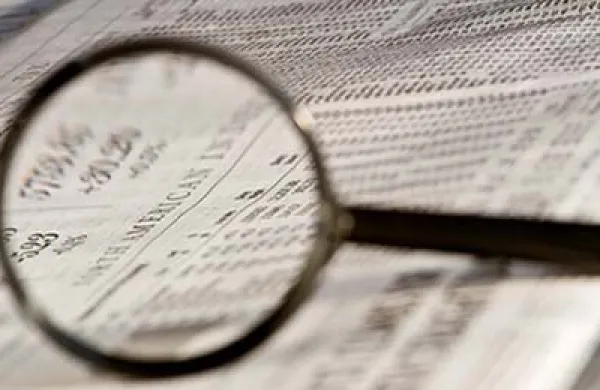It's a chilly, drizzling day in early June, and in downtown Buenos Aires, protesters are setting off firecrackers and littering the sidewalks with leaflets urging citizens to join a nationwide general strike the next day. Trucks rumble through the streets periodically, loudspeakers crackling an appeal for worker solidarity. The object of the workers' ire: a recent government decision to slash public sector wages by 12 to 15 percent.
"Those are my friends," says Minister of the Economy Jose Luis Machinea with a wan smile in his sparsely furnished fifth-floor office in the ministry. "They've come to tell me how grateful they are that we've lowered their salaries."
Machinea is the public face of Argentina's fierce austerity. Along with tax hikes and sweeping cuts in public spending, the government in May cut wages as part of a rough plan to reduce Argentina's soaring fiscal deficit. Last year's $7.1 bi l ion deficit equaled 2.5 percent of gross domestic product, up sharply from 1.3 percent in 1998. Argentina must balance the budget by 2003, as required by a 1999 law, and reduce the 2000 deficit to $4.7 billion to meet the terms of a $7.4 billion International Monetary Fund credit facility.
The government faces a difficult task. GOP, which shrank 3.1 percent in 1999, rebounded only modestly to an annual rate of just 0.9 percent in the first quarter. Economists predict growth of 2.5 percent this year, a far cry from the 5.8 percent averaged between 1996 and 1998. The six U.S. Federal Reserve Board interest rate hikes between June 1999 and June 2000, which totaled 175 basis points, have sent the cost of Argentina's $147 billion in external debt soaring. That situation is complicated by a convertibility law that pegs the value of the peso to the U.S. dollar; government policymakers cannot simply print money to spur growth.
Although Argentineans appreciate that convertibility stabilized the economy, many have lost patience with the fiscal prudence that has resulted in an unemployment rate of 14.7 percent—it has not fallen below 12 percent for the past six years—and that reduced per-capita income by more than 7 percent between 1997 and 1999.
"Young people cannot find jobs, old people are losing their jobs, and now they are losing their pensions," says Rodolfo Daer, who heads the Confederación General de Trabajadores, Argentina's largest union. The CGT organized the one-day strike on June 9 in which 60 percent of the workforce participated.
The Alianza por Trabajo, Justicia y Educación—a coalition of the center-left Unión Cívica Radical party of Machinea and President Fernando de la Rúa and the left-leaning Frepaso—won last October's presidential election on an anticorruption, pro-growth platform that promised new jobs along with fiscal responsibility. The party slogan: "Growth with equity." De la Rúa and Machinea hoped that a stringent fiscal policy would restore confidence among both foreign investors and the public and reduce the country's borrowing costs, eventually stimulating consumer demand and generating new jobs. That could still happen, but at the moment it appears a distant prospect.
"We have done what we needed to do," says Machinea in an interview with Institutional Investor. "I am at peace with myself, and I have the support of the president, which is important. I would have preferred a faster recovery, but it didn't happen."
To be sure, many of Argentina's problems reflect forces beyond the current administration's control. It inherited a bloated public sector and an economy in need of structural reforms. That became painfully evident when Brazil devalued its currency by 35 percent in January 1999 and Argentina's goods and services became less competitive vis-à-vis its top trading partner (Brazil absorbs 30 percent of Argentinean exports). Making matters worse is the recent weakness of the euro, because the European Union rakes 18 percent of Argentina's exports. Some 60 percent of its exports are agricultural, so depressed commodities prices exacerbate the country's problems.
At stake for Machinea and company is not just the health of a $290 billion economy, second in size only to Brazil's in Latin America. (Argentina is No. 1 in the region in per-capita income, $7,840 versus Brazil's $3,840.) Argentina, like Chile and Mexico, has come to symbolize the triumph of economic liberalization and free-market reforms in a major emerging market. When Carlos Saúl Menem was president, from 1989 to 1999, the government stabilized the economy by selling off major state-owned enterprises, eliminating barriers to trade and, most critically, banishing a deeply entrenched inflationary psychology. The weapon of choice in that battle was the currency board, which pegs the value of the peso to the U.S. dollar. (It requires Argentina's Treasury to keep in its reserves a dollar or the equivalent in gold for every peso in circulation.)
While Brazil's faltering economy and devaluation hurt Argentina last year, Brazil is now on the mend. GDP is expected to grow 4 percent this year. The Mexican economy, thanks in part to Nafta, not only weathered the winds from Rio but seems to be thriving: It grew 3.7 percent in 1999. In April its bonds were raised to investment grade for the very first time.
Machinea and the de la Rúa administration are in quandary. Even as the government takes steps that no mainstream economist would challenge—reducing deficit spending, for example—it has failed to persuade either foreign investors or the Argentinean public that its policies will actually deliver the recovery the country needs. Politics is salesmanship, and Machinea and company have yet have to demonstrate the requisite touch.
Soft-spoken and reserved, with a self-effacing charm, Machinea is widely admired for his competence and integrity. "Sometimes he is too honest," jokes Rodolfo Terragno, the chief of the cabinet. But the economy minister, grappling with disenchanted countrymen, also has failed to win over Wall Street, where investors and analysts worry that Machinea's free-market ideology may not be sufficiently pure. Says David Sekiguchi, a vice president at J.P. Morgan Securities in charge of fixed income and currency strategy for Latin America: "He has failed to instill confidence and to establish credibility. Investors are still skeptical that he is a free-market convert." If Machinea's most pressing task is to inspire confidence, he has come up short so far. When he took office in December, the government's international financing needs for 2000 were $9.8 billion. (That compares with the $3.8 billion required by Brazil–an economy twice the size of Argentina's.) Though Argentina has raised $6.7 billion of that, perceived risk has made that borrowing more expensive.
Machinea's failure to win over the Street became starkly clear when news of an unexpectedly large April deficit sparked a sell-off of Argentinean debt, raising the spread over U.S.Treasuries by 275 basis points. Despite the government's spending cuts, investors remained wary that they would spark economic growth. Says James Barrineau, vice president of emergingmarkets research at Alliance Capital Management: "They have done the right things. But they haven't done a great PR job, and the economic statistics and the structure of the economy are not working for these guys."
On the international front Machinea displayed some political naïveté after a June 5 meeting with U.S. Federal Reserve chairman Alan Greenspan. Eager to reassure investors that the worst of the interest rate hikes were over, Machinea relayed to a Reuters reporter his conversation with Greenspan. "From what I have inferred about what he told me," the Reuters report quoted Machinea as having said, "we are obviously in a better position than we were 20 or 30 days ago in terms of expectations of interest rates. Either they won't go up or they will go up by less." Machinea later denied having made the statement, but the reporter produced a tape recording of their conversation that showed he had.
This was a minor, if embarrassing, episode. And last month de la Rúa publicly endorsed his minister's policies—which probably means that Machinea has some time. But if Argentina's economy does not pick up steam, Machinea may well take the fall.
A longtime public servant, Machinea has confronted failure before: As central bank governor in the late 1980s during the administration of Raúl Alfonsfín, Machinea orchestrated the much-derided Plan Primavera, or Spring Plan, which funded the deficit by issuing domestic debt at exorbitant interest rates. The result: a forced devaluation and a 5,000 percent inflation rate.
In his quiet way Machinea insists that he is the right person for the job. Inside the cabinet he represents a moderate position. Both Defense Minister Ricardo López Murphy and Fernando de Santibañes, who is the head of Argentina's intelligence agency and is considered de la Rúa's closest adviser, stake out positions considerably more orthodox about free markets than Machinea's. (During the presidential campaign, López Murphy called for reductions in public sector wages.) At the same time, Frepaso members of the coalition, such as Vice President Carlos (Chacho) Alvarez, stand to the left of the economy minister. Says Machinea: "A more orthodox minister could give more confidence to the markets. But he would give less confidence to the Alianza party."
JOSE LUIS MACHINEA CONFRONTS MORE THAN his country's current economic woes. He must also contend with Argentina's stormy past.
A farmer's son who grew up in Puerto Madryn, a small town south of Buenos Aires, Machinea received his college degree in economics from the Universidad Católica in Buenos Aires and a Ph.D. in economics from the University of Minnesota. He married in 1971, and a few years later he and his wife had the first of two girls. One indication of how intensely private he is: When he separated from his wife in 1996, virtually no one knew about it for two years. When he remarried in 1999, few knew about that, either.
Machinea went to work in 1970 as a researcher at the Ministry of Planning. In 1979 he moved to the central bank where he rose through the ranks to land the top job in 1986.
Those were the early days of the Alfonsín administration, Argentina's first democratically elected government after two decades of military rule and political repression. Alfonsín's team struggled to control a swollen fiscal deficit but failed abysmally. Machinea was kicked out, as was Alfonsín three months later. "They were tough times," Machinea recalls. "There were a lot of accusations. But through it all, no one questioned my honesty. Ten years later I have shown that I should have another chance."
Machinea suggests that the "trauma," as he calls it, of the late 1980s shaped his moderate economic philosophy—he is neither a rabid free marketer nor an advocate of big government. "I'm a person who believes there is a margin for active government policies," he says. "But that margin is much smaller than people realize." He describes himself as a "neoKeynesian realist."
It was Menem, the Peronist party candidate elected president in 1991, who finally exorcised the specter of inflation that had destroyed so many hoped-for recoveries. The 1991 dollar-convertibility law—introduced by economy minister Domingo Cavallo—brought inflation down to virtually zero.
Menem also pushed through an ambitious agenda of privatization, selling off about $32 billion in state-owned assets, including the national phone company, Entel, the pension system and Aerolineas Argentinas, the national airline. Soon after, foreign investors came to trust that Argentina's free-market reforms would last. As a result of Menem's program and Argentina's integration into Mercosur, the regional common market, GOP grew at an average annual rate of 8.2 percent between 1991 and 1994.
The sudden collapse of the Mexican peso in December 1994 devastated economies throughout Latin America. Argentina's GOP shrank nearly 3 percent in 1995. Even as the country confronted its worst recession since the 1930s, the convertibility law prevented a devaluation that could have made exports more competitive or spurred growth through government spending. But the government stood firm and the currency held steady. After a painful contraction, followed by a stinging tax hike, the economy began to recover.
GOP expanded by 4.8 percent in 1996, and Argentina weathered the Asian financial crisis in the autumn of 1997, growing 8.6 percent that year. The expansion continued during the first half of 1998, only to face a new set of emerging-markets shocks that included the collapse of the Russian ruble in August 1998 and the Brazilian devaluation in January 1999. In the fourth quarter of 1998, the economy contracted 1.8 percent, signaling the start of a yearlong recession.
Because Argentina could not export its way out of its slowdown, growth remained stagnant through 1999. But the economy shrank just 0.3 percent in the fourth quarter, leading observers to believe that a recovery was imminent. And when the October elections proceeded without incident, Argentinean debt began to strengthen. The spread on the benchmark floating-rate bond tightened from 1,040 basis points over U.S. Treasuries in July 1999 to 600 over in January 2000.
Wasting no time, de la Rúa in his first month in office signed a $7.2 billion standby agreement with the IMF that was conditional on Argentina's reducing its deficit to $4.7 billion (1.6 percent of GOP) and increasing taxes. In March the administration pushed through a labor reform law that eased hiring conditions for temporary workers and weakened the power of the unions in contract negotiations.
To rein in the deficit, in January the government raised income taxes by $2 billion, about 4.7 percent of total revenue collected, and cut spending by $1.4 billion. Critics charge that those moves choked off the nascent recovery by depressing consumer consumption, which accounts for some 80 percent of GOP, and that the government should have cut spending more dramatically. "The tax package generated a bad mood in Argentina, especially among the middle class," says Miguel Kiguel, secretary of financing in the Menem administration and now the president of Banco Hipotecario.
By April the country's monthly fiscal deficit hit $630 million, close to the entire second-quarter target of $690 million that had been set by the IMF. This sparked a massive sell-off in the debt markets that widened the spread over Treasuries from 475 basis points to 750 and prompted the government to make additional budget cuts. The sell-off was intensified by the sharp drop of 39 percent in the Nasdaq between March 10 and May 23.
To assuage Wall Street's fears of any backsliding, Machinea's office set up a conference call with major investment firms on May 12 to announce that de la Rúa had asked him to reduce spending by $600 million. But Machinea's honesty got in his way. He talked openly about how tough it would be to make the cuts, which left foreign investors wondering if he could really pull it off. "They were in a good position to generate confidence, but it was a disaster," says one Wall Street debt strategist. Another emerging-markets bond fund manager says: "Instead of laying out two or three things, he laid out 50. That did not generate a lot of credibility." Machinea's undersecretary of financing, Daniel Marx, concedes, "Generally speaking, people did not reduce their doubts in a significant way."
It soon became clear that Machinea's support within the government was weak, and rumors swirled that he might lose his job. The day after the conference call, cabinet chief Terragno said that the economy needed a boost, not a fiscal adjustment. A week later de la Rúa's top adviser, de Santibañes, went on prime-time television to say that the government actually needed to cut much more—$1.5 billion.
"No one is to be blamed," Terragno said when asked about the conflicting government voices. "I was upset by the circumstances and if a mistake was made, it was the whole team, including me." Says Machinea, "Everyone knows that you can't go around saying different things."
"We thought we had done enough [after the January budgets]," says Machinea. "But the economy did not grow as we expected, and we had to send a strong signal to the markets." This time the cuts would come in the form of dramatically lower public sector salaries and reduced pension benefits.
On May 26 Machinea was supposed to announce the details of the new spending cuts, but he postponed because of "technical problems," his press spokesman said at the time. Recalls Machinea, "We had the package ready, but the rest of the cabinet didn't all know about it, at least all the details of it." There followed a marathon weekend of meetings. On Monday May 29 the government announced it would cut $968 million from its budget and overhaul the generous health care system, long seen as a major burden on the national coffers. Machinea also presented to Congress a bill to cut spending in Argentina's 23 provinces. "It was a tough decision," says Machinea. "But we had no alternative." On June 5 Machinea and three of his advisers flew to New York to sell the story to Wall Street.
The debt markets bounced back—spreads on the benchmark floating-rate Brady bond tightened from 750 over Treasuries on May 29 to 580 on June 17—but analysts still had their doubts about Machinea.
At the moment, Argentina appears to be on target to reduce its deficit to $690 million for the second quarter. The government netted $813 million in June from a Brady bond swap, of which $486 million will be used to meet the IMF's second-quarter target. Along with funds raised in the international markets, this swap helps bring the country's external financing needs down to $3.1 billion, versus $9.8 billion at the start of the year. Domestic pension funds are expected to absorb $1 billion of that total.
The recovery remains fragile. Says Geoffrey Dennis, chief equity strategist for Latin America at Salomon Smith Barney, "Argentina will grind itself through a disappointing recovery." While the country will meet its second-quarter IMF targets, the third-quarter and year-end figures will probably have to be renegotiated. That will likely mean more cuts. Says Machinea: "There is not much left to cut. But I will not raise taxes again, and if we need to cut, we will."
Does he think his job is at risk? The question seems to surprise him. "I want to end this job doing what I want to do—re-creating the economic conditions for growth and employment," he says. "If I have to leave before [the term ends], that would not be the best way to accomplish this." Spoken like a man who has devoted most of his career to government service.
"I don't know why I like the public sector so much," Machinea says. "But I do."





